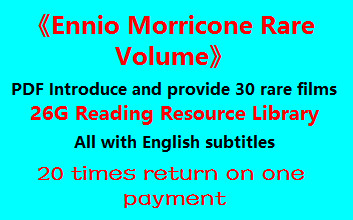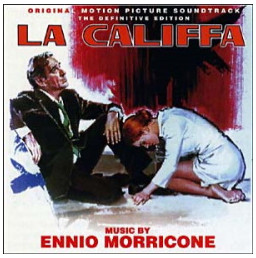LA CALIFFA (1970)
La Califfa – the Lady Caliph – is an Italian drama film written and directed by Alberto Bevilacqua, starring Romy Schneider and Ugo Tognazzi. The film is about civil unrest and class warfare, and sees Schneider playing a woman named Irene Corsini. When her husband is killed by the police in a violent clash during a strike, Irene becomes the militant leader of a group of downtrodden factory workers, and finds herself becoming engaged in an increasingly bitter struggle with Doberdò (Tognazzi), a former colleague of her husband who is now the manager of the factory at the center of the strike. However, unknown to the other workers, Irene also begins a stormy love affair with Doberdò that threatens to derail her cause.
Of all the gorgeous love themes Ennio Morricone wrote in his career, the one from La Califfa is my favorite. It’s central presentation, in the cue “La Califfa,” is one of those pieces which just makes you melt. A rich, sonorous oboe introduces the melody, which drips with romantic affection and swooning tenderness, before switching to lyrical bank of strings, to carry the piece on. A subtle, almost subliminal piano countermelody adds depth, the briefest interlude for soft horns changes the color of the piece, and then the oboe returns, giving the relationship between Irene and Doberdò the most bittersweet of musical resolutions – a forbidden passion that they both want but cannot have. I could listen to this theme all day; it’s the side of Morricone I love the most.
Of course, there are other aspects to the score too. “Sangue sull’Asfalto” is a dramatically intense piece that features tolling bells, harsh electronic stabs, and a religioso orchestral sound to make the death of Irene’s husband all the more tragic; the theme from this cue appears later on several other occasions, including in the moving “Sotto la Pioggia,” “Addio Alla Fabbrica,” and “Ricordo Di Un Amico,” where the theme is rendered on an acoustic guitar underpinned with urgent piano lines.
Later,“Requiem Per Un Operaio” is a disorienting mass of overlapping voices; “La Donna Al Fiume” is an emotionally intense combination of more rolling pianos, elegant woodwinds, and gorgeous soprano work from the ubiquitous Edda dell’Orso; “La Pace Interiore” is a liturgical church organ piece; “Dentro La Macchina” revisits the rolling piano motif with a more dissonant accompaniment; “La Cena” and “Prima e Dopo L’Amore” do the same, but with a heartbreaking viola solo at the core. “L’Impatto” is perhaps the closest the score gets to having an action cue, in which a deconstructed take on the secondary theme is underpinned with harsh snare drum rhythms, tolling bells, and a strumming mandolin.
The version of La Califfa that I own is the one released by the Italian label Screentrax in 2000, but there are several others which provide an excellent overview of the score, including an expanded release from Quartet Records that came out in 2004 and pairs the score with music from the 1969 film La Monaca di Monza. Whichever one you choose, this is an essential Morricone work, with one of his most beautiful main themes.
Track Listing: 1. Sangue Sull’asfalto (2:35), 2. La Califfa (2:37), 3. Requiem Per Un Operaio (2:23), 4. Sotto La Pioggia (1:46), 5. Le Donne Al Fiume (1:04), 6. La Pace Interiore (1:15), 7. Dentro La Macchina (2:52), 8. Addio Alla Fabbrica – Movie Version (1:04), 9. Ricordo Di Un Amico (1:38), 10. Le Donne Al Fiume (#2) (1:07), 11. La Cena (2:43), 12. Notturno (1:01), 13. La Donna e La Campagna (3:41), 14. Prima e Dopo L’Amore (1:57), 15. Gelo e Disprezzo (1:19), 16. Trittico Per Organo (3:30), 17. Fari Nella Notte (:57), 18. L’Impatto (1:38), 19. La Pace Interiore (#2) (1:26), 20. La Donna e L’Agente (2:38), 21. Addio Alla Fabbrica – Album Version (1:04), 22. La Califfa #2 (10:11), 23. Finale (2:16). Screentrax CDST-323, 52 minutes 42 seconds.












